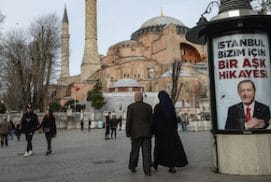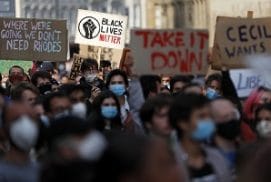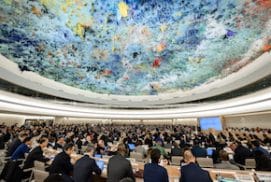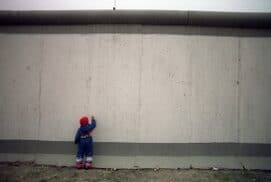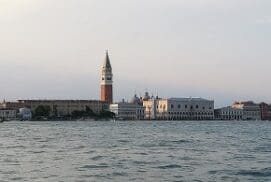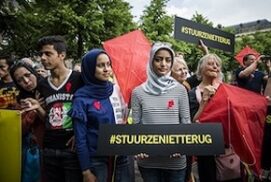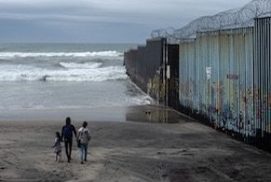This dossier stems from the debate sparked by Elizabeth Suzanne Kassab’s article—which opens this collection—on the transformation of the Arab intellectual scene after 2011. Her notion of a “new contemporary” in Arab thought prompted a series of contributions that do not aim to offer solutions, but rather to raise new questions, probe unresolved issues, and put forward critical perspectives. Bringing together Kassab’s essay and two related pieces, the dossier explores how Arab thought is redefining itself in light of the uprisings, the failures of political transitions, and the moral and intellectual rupture marked by Gaza.
Dossiers
- As the Black Lives Matter protests have rocked the US and much of the West over 2020, the fight against public traces of an unforgotten era of North-South domination has gained the center of the battleground in public debate – at least for a few months. A push that adds pressure and calls to serious reflection many Western cultural institutions, and one type of them most importantly: ethnographic museums. From Paris to Geneva, from Tervuren to Berlin or Milan, all “museums of civilizations” – as they are now increasingly known – have been grappling for years with issues such as restitution, contextualization, ownership and a complete rethinking of their own mission. This Dossier looks at this very challenge, one in which questions and pressures are far more clear than answers. Together with a piece outlining in detail what is at stake, readers will ‘hear’ voices, and experiences, on the matter from Europe as well as Africa.
- A week after the “re-inauguration” of Hagia Sophia as a mosque, diplomacies are still struggling to understand the full implications of the shocking and yet largely expected choice by Recep Tayyip Erdogan’s government. But beyond the radars of the international attention, the move and its internal welcoming confirm the uncontented grip he continues to have on Turkey, driving it towards an increasingly nationalist, anti-modern path. In this Dossier, we explore the rationale behind those choices, the implications for regional affairs, as well as those on religious pluralism worldwide. For policy-makers on both sides of the Atlantic, there is much to care about, and some dire practical recommendations to take into account.
- Today’s world and tomorrow’s America don’t look the same as they did one month ago. If that is the case, socially and politically, it is not just because of the “revolutionary” power of the Covid-19 pandemic, which has demonstrated its ability to disrupt well-established political leaderships, but also because of a different, human-moved force of change: the global anti-racist revolt which has followed George Floyd’s murder. How will it impact on the US, four months short of a crucial election, and the world? A kaleidoscope of stories, voices and perspectives in this special ResetDoc Dossier.
- What happens when closed borders become the norm? After the pandemic, will they be back as a defining feature of 21st century life?
- Is it truly impossible to reconcile the universality of rights and the specificity of belonging? A trans-national debate stemming from Seligman and Montgomery’s paper “The Tragedy of Human Rights”
- Some historical events do not stop releasing their powerful lessons even years or decades later. That is beyond doubt the case with the fall of the Berlin Wall, and the rest of the chain of events which marked the collapse of the Soviet system over 1989. Its significance for Europe, and for ourselves, still merits being investigated thirty years later. That is what this Dossier tries to do, with the accounts and reflections by Riccardo Cristiano, Simone Disegni, Marta Facchini, Siegmund Ginzberg, and Lorenzo Monfregola.
- Contrary to all predictions of an era dominated by digital agorà, especially for the youngsters, the square is back as the primary place and instrument of protest. A comparative enquiry.
- Giuliano Amato; Sheri Berman; Mohsen Kadivar, Yael Tamir, Michel Wieviorka. A panel of highly distinguished speakers closed up the last edition of the Venice Seminars organized by ResetDoc and dedicated to the highly pressing challenge of the “dehydration” of the tradional sources of democracy. In order to give the discussions held maximum circulation, the present dossier features the proceedings of the high-level roundtable chaired by Ambassador Pasquale Ferrara, making up a remarkable chorus of voices on the way forward for a true “re-birth” of democracy.
- In the country once famous for its multiculturalism and its civil rights, today the wind seems to have changed. A new extreme right has appeared and risks changing the political landscape at the next European elections. Thierry Baudet, the leader of the Forum for Democracy, is educated, dandy, histrionic, quotes philosophers and speaks to young people and citizens. In the Dutch populist competition, it seems that Geert Wilders’ star has found a worthy competitor.
- An “illiberal trend” is haunting Europe. And the United States. It is a virus that is eating away at our democracies, which seem ever less to resemble “Liberal Democracy.” Freedom of the press and freedom of religion are being squeezed across Europe; independent institutions are contested by political parties that enjoy significant public support. The fundamental respect for human rights is no longer the guiding principle of the democracies that emerged from the Second World War.




